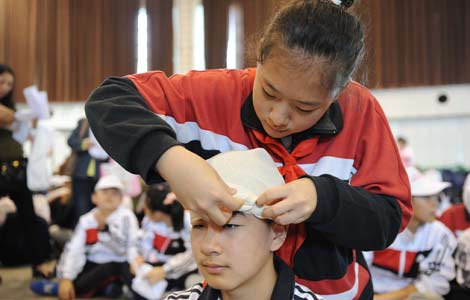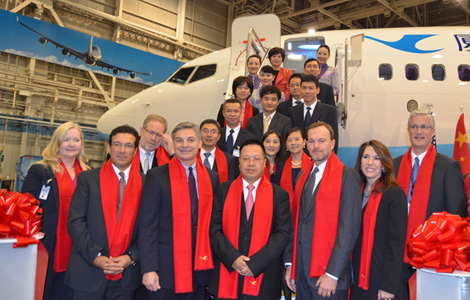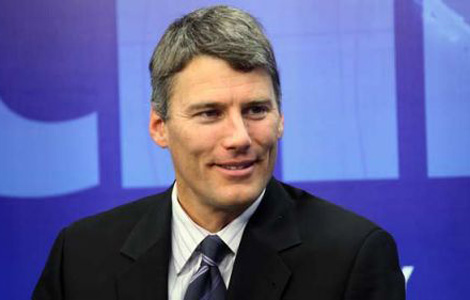Reform blueprint opens a new era
Updated: 2013-11-14 07:27
(China Daily)
|
||||||||
Experts share their understanding of the communique released on Tuesday after the Third Plenary Session of the 18th Communist Party of China Central Committee, which offers an all-round blueprint of nation's reform in the next decade.
Nonpublic sector
China's basic economic system depends on public ownership as its main element but allows for various ownership models. Both public and nonpublic ownership are important components.
The communique shows that the leadership's policy on the non-public sector, especially on the small and medium-sized enterprises, is consistent.
This sends a positive signal to private investors.

Now the thing is to turn words into action. Although the government had promised to support the private sector, initiatives were not carried out well because of institutional barriers.
As a recent judicial document has called for equal treatment of public and nonpublic sectors, it is likely that other institutional barriers will be broken.
The private sector may be allowed to invest in State-owned assets and monopoly industries and to acquire resources on an equal basis as other investors.
Such changes will be difficult and gradual, since the central government has to deal with interest groups.
But despite the difficulties, the change is necessary at a time when maintaining employment is crucial. Small and medium-sized enterprises provide more than 85 percent of employment.
Market role
A unified, open market with orderly competition is needed to let the market play a decisive role in resource allocation.
Reform in this regard is to address three major obstacles for building a unified and open market.

First, China's industrial policy leans toward certain industries selected by the government that receive favorable treatment. But this is not in line with the goal of building a "competitive" and "equitable" market. Reform is expected to reduce and eliminate the government's micro-level maneuvering in the economy.
Second, despite progress in the past decade, China's market is still heavily fragmented by different industries and local governments. For example, before the current Ministry of Transport was reorganized, the logistics industry was divided by railways, roads, waterways and aviation, each administrated by different agencies. Local protectionism is widespread. For example, local governments insist on using local equipment and transportation vehicles. All these factors hindered a unified national market.
Third, industries often face excessive administrative charges and fines because of irregularities in government supervision.
Government role
Government functions must be transformed in a down-to-earth manner to establish a law-based and service-oriented government. China needs to deepen reforms of the administrative system and innovate administrative methods.
The restructuring of the administrative system is a major part of political reform.

I think the effective government management mentioned in the communique requires the government to transform its function to maintain social justice, and provide a better environment and public services.
Previously, many people complained that it was difficulty to obtain government services. Now people can solve their problems and get more comprehensive services in an administrative service center under many local governments. I think it's an innovation of administrative management and can boost government credibility.
All in all, the key task of the administrative reform, I think, is to have statutory power for responsibility and procedure. The government should know more clearly about what it is doing, what it should do, and how it can do it.
Modernizing governance is the goal of the reform, and I feel that the government has moved toward modern public administration from traditional management.
Fiscal reform
Reform in the fiscal and tax field, which was seen as a pillar in running the country, will focus on improving legislation, fairness and efficiency, and stabilizing the tax burden, to build a modern fiscal system.
Public finance plays a fundamental role in the country's governance, which was never before given so much importance. Fiscal reform will play a key role in ensuring efficiency and fairness.

Also mentioned for the first time in the communique was that the tax burden will stabilize, meaning that the growth in fiscal revenue will be in line with economic growth, rather than the previous thinking of "the more the better".
But this doesn't necessarily mean that the tax reforms, which are already in progress, will be suspended or delayed.
The reform to replace business taxes with value-added taxes to avoid duplicated taxation and ease the tax burden will continue, while environmental and resource taxes will be the major factor in the next round of tax reform.
Last but not least, the communique called for matching fiscal revenue and expenditure, which was designed to ease the excessive liabilities on the shoulders of local governments. In the future, the central government will shoulder more expenditure.
Urban-rural issue
Farmers should have more proprietary rights. Rural and urban matters should be exchanged equally. A unified market should be established for construction land in both urban and rural areas.
To build a unified market for construction land in the city and countryside, the government must allow rural collective land to enter the market.

There are many strict restrictions that prevent farmers from trading their contracted land, construction land and houses, which are important sources of property income.
Some places in Zhejiang and Guangdong provinces have piloted this reform for years. It is time to learn from these pilot programs and remove the institutional barriers hindering reform nationwide.
There should be equal treatment, in terms of property rights and land prices, for construction land in the city and in the countryside. Only a fair and equal market can guarantee the free transfer of land. The government should give farmers the power to sell, mortgage and rent their land and houses.
Allowing construction land in rural areas to enter the land transfer market is a necessary trend for China. But the authorities must first confirm those with property rights and set up a reasonable profit distribution mechanism.
Opening-up
New policies will apply both to domestic and international fronts. China will lower the investment threshold, step up the development of free trade zones and increase opening-up of inland, coastal and border areas.
E xpanding the scope, and quickening the pace, of opening-up is stressed, which means the Chinese economy will be increasingly integrated with the world economy.

During the initial years of the opening-up process, our awareness of international rules was weak, but our opening-up efforts came into line with global rules since China joined the World Trade Organization.
However, our opening-up at that time was selective, which meant we largely opened up sectors in which China enjoyed comparative advantages. For those industries where our advantages were poor, such as the trade in services, we tended to be conservative in opening up and retained the monopoly of State-owned enterprises in some sectors.
The plenary meeting charts a new path, which means State monopolies will be limited and access to foreign investors will be broadened.
A new opening-up system will be established based on the example of the Shanghai Free Trade Zone. The effort is to establish a totally free trade system by loosening entry controls. The essence of the effort is to allow all qualified companies to enter the market.
Democracy
Greater significance will be attached to perfecting socialist democracy and enriching democratic functions. Democracy at the grassroots level should be expanded.
The communique's aim is to improve socialist democracy by expanding democracy at the grassroots level.

Promoting democracy at the grassroots level can be achieved with direct elections of local lawmakers. The public now can only directly elect lawmakers at the county or district levels, while lawmakers from higher-level congresses are elected by lower-level congresses. Direct elections for higher-level lawmakers may be carried out as pilot programs in small cities.
This is one way that the National People's Congress system can be improved and advanced.
Secondly, improving the autonomy of both villager and urban neighborhood committees is a feasible way to advance socialist democracy.
Some laws used by village and urban committees need to be revised because they are outdated. By improving autonomy at the grassroots level, an awareness of democracy among the public can be nurtured.
Judicial reform
Endeavors should be made to uphold the Constitution and laws, deepen reforms in administrative law enforcement, ensure independence and fairness in prosecuting bodies and courts, and improve judicial practice.
Judicial independence is the key to ensuring justice.

Disputes need to be handled by rule of law, which means that if justice is not ensured, many problems cannot be solved. New conflicts will flare as well.
To ensure independence, local governments must be required not to interfere with legal organs, while judicial departments should be daring enough to say "no" to intervention.
In other words, removing administrative elements from legal authorities is crucial for the achievement of judicial independence.
As legal professionals, we have reached a consensus that jurisdiction can be free from administrative influence. And there have been successful examples of bodies remaining independent of the influence of local governments, as with the branches of the People's Bank of China.
Some legal professionals have suggested that all local courts should be under the administration of the top court. But I think it's more realistic to bring local courts directly under the management of their upper-level courts.
Anti-corruption
A scientific and effective mechanism should be established to curb and coordinate power. The anti-corruption system should be renovated and improved. Power should be reined in with regulations and supervised by the people.

The communique does not put forward detailed new measures on anti-graft, and I believe the current measures on anti-corruption, such as dispatching inspection teams to government agencies, are going to be continued.
The government's power is not likely to be highly concentrated, as some experts suggested it would be. Instead, the power will continue to be diluted since this is a requirement of modern administration as well as the demand of the people.
The anti-graft authorities might explore more effective measures, including asset declarations by government officials, under the current framework of power.
China has many anti-graft agencies, including the Party's disciplinary department, the government's supervision authority and the procuratorate's anti-graft bureau. The watchdog authorities should be coordinated to make them more effective. The government should also move forward in disclosing information and boosting transparency.
Culture industry
The cultural management system should be improved to build and perfect the contemporary cultural market, establish a public cultural service system and raise the level of openness.
The reform of the cultural management system has been ongoing since 2003, with the main aim to let the market play its role in the culture industry, and let the government focus on public cultural service.

In the past decade, work has been done to transform many State-owned cultural institutions into businesses.
The government has basically established a public cultural service system and a contemporary cultural market.
I would interpret the part related to the culture industry of the communique as setting a higher standard for the quality of the ongoing reform. We can expect that the market will play a more important role in the culture industry.
In the previous seven third plenary sessions of the Central Committee since 1978, the communique has mentioned a focus on economic development five times and twice mentioned agricultural reform. This is the first time it has raised culture to the same level as economic development.
Social affairs
China will speed up the reform of social affairs including education, social insurance and the medical sector. The nation will work hard to build a reasonable and well-organized income distribution system.

During the past 35 years, some Chinese got rich thanks to reform and opening-up, but common affluence has not been achieved. The wealth gap is widening at a worrying speed as a small number of people have a vast majority of the wealth. Meanwhile, middle-income earners are burdened by soaring housing prices.
The government should show more courage and determination to limit the pay of executives in State-owned enterprises and take concrete measures to facilitate collective bargaining for workers to seek decent pay and pay raises.
To make social welfare fairer and more sustainable, more detailed policy packages are needed with special efforts to boost the welfare coverage of China's 260 million migrant workers.
As the population is aging while the size of families is shrinking, the government should increase investment in pension programs to make sure low-income workers can receive sufficient pensions in their later years.
Social governance
To improve social governance, it is vital to stimulate the power of social organizations and come up with innovative and effective measures to prevent and solve social conflict.

The communique uses the concept of "social governance" to replace "social administration", which sends a clear signal that the government will not be the sole actor in managing social affairs. In other words, social organizations are welcome to play a role.
Social organizations in China refer to nongovernmental organizations and mass organizations such as the All-China Women's Federation. This also follows the global trend of encouraging multiple actors and cooperation to better solve social conflicts and tensions.
The 18th National Congress of the CPC held last year recognized the role of social organizations as service providers to meet the public's diverse needs. The third plenary session has called for expanding the space in which social organizations can grow.
Authorities should further think about how to facilitate social organizations as mediators amid the growing number of petitions and mass incidents.
Ecology
A comprehensive system for ecological progress that protects the environment will be established. A compensation system for the use of resources and a system of ecological compensation will be implemented.

Environmental protection is among the Party's top priorities and the meeting lays out a comprehensive blueprint for the building of an ecological civilization. Top policymakers have pledged to reform the current environmental protection system and establish an integrated mechanism that monitors all pollutants.
Reform of the environmental protection system is one of the major parts of China's economic transformation and a precondition for low-carbon development. It is central to solving the environmental hazards that harm the public's health.
We must strive to safeguard the indivisibility, diversity and sustainability of our ecological circle and enhance the integration and effectiveness of supervision efforts.
Reform of environmental protection systems requires comprehensive, sophisticated and systematic efforts.
Military reform
The Party will strive to clear obstacles for the development of national defense and the army. The goal is to build an army that obeys the Party's command, is capable of winning battles and has a sound work style.

The core idea of China's military reforms is to break the traditional divisions and integrate the different army branches together.
The traditional system, which commands the armies based on different branches, is ineffective, and a joint operation office is required to improve the army's combat capability.
Civil-military integration, a major part of the military reforms, can boost the development of China's military technology with the help of various sectors of society, instead of simply relying on military factories.
On the other hand, the integration will also require local governments to adopt military standards in building bridges and roads to guarantee the smooth transportation of armed forces.
Moreover, civil-military integration also aims to improve the quality of soldiers.
The military has already improved preferential policies to attract more elite candidates, especially from top universities such as Tsinghua University.
Lead reform team
It is important to strengthen and improve the leadership of the CPC while deepening reform. A central leading group will be set up to design and coordinate reform and to supervise the implementation of plans.

After 35 years of reform and opening-up, the easy tasks have been accomplished, but what's left is the "hard bone".
It is becoming more difficult to implement reforms and the requirements for systematic and integrated work are getting tougher.
Under these circumstances, it is necessary for the CPC Central Committee to establish a team to take the lead in making sure reforms are carried out across all sectors.
The lead group should be responsible for the chief reforms.
There have been similar reform groups in China. The lead group, rolling out reforms in politics, economy, society, culture and ecology, is expected to have stronger coordinating powers than previous institutions.
Since the new leadership has repeatedly emphasized streamlining government structure, the lead group will be merged with the Central Finance and Economy Leading Group.


 Rare bird finds sanctuary
Rare bird finds sanctuary
 Government leaders to be held accountable for school safety
Government leaders to be held accountable for school safety
 Deadly looting in Philippines
Deadly looting in Philippines
 Graduation celebration for Santas
Graduation celebration for Santas
 One World Trade Center deemed tallest US skyscraper
One World Trade Center deemed tallest US skyscraper
 Xiamen Airlines gets milestone 100th Boeing
Xiamen Airlines gets milestone 100th Boeing
 PANDA! set to debut in Las Vegas
PANDA! set to debut in Las Vegas
 Lest we repeat the horrors of the past
Lest we repeat the horrors of the past
Most Viewed
Editor's Picks

|

|

|

|

|

|
Today's Top News
Chinese opera looks to the West
SAT alternative makes bid for Chinese takers
GM international office moves to Singapore
Leader honored for improving cross-Strait ties
Government leaders accountable for school safety
Banks'nonperforming loans up slightly in Q3
Investment treaty with US offers risks and rewards
Quality growth 'to be achieved'
US Weekly

|

|





